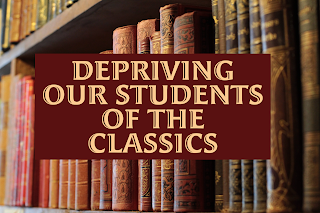The Penderwick series of five novels written by Jeanne Birdsall. In the first book, The Penderwicks, we meet the Penderwick sisters; Rosalind, Skye, Jane, and Batty. Perhaps it is because I have two sisters and five daughters, I related with these girls so deeply. We also meet the girls' father, a widow.
I first related most with Rosalind, the oldest sister that, in many ways, took over as a mom-figure when their mother passed away. As tends to happen in families that are larger, they develop a culture and phrases all their own. Rosalind is the OAP, or Oldest Available Penderwick. She cares for little Batty like a mom, and the reality is it has been tough to grow up so fast and have to take on that role. And yet, she loves her sisters and naturally did what needed to be done. Their father is a very intelligent professor, devoted to his daughters, but being a single dad is challenging.
As the series continued, the writer in me felt an affinity with Jane. Always in her head, living in a bit of a fantasy land, reminds me of the girl I used to be and even the woman I am now. I can easily slip into my imagination, and that has been a saving grace many times.
My daughter and I just finished The Penderwicks at Point Mouette. It was, to both of us, the best so far. The girls are growing up, maturing, but their personalities are still so individual. They are meeting new challenges, such as Skye taking over as the OAP when Rosalind takes a vacation to Maine separate from her sisters. The father is remarried and honeymooning in Europe. The girls seem to be okay with this, liking the new step-mother and her very young son. As the OAP, Skye fears failure, and takes the responsibility as the OAP a little too seriously.
As the girls get older, their challenges become a little more mature. The most praiseworthy element of the Penderwicks, in my point of view, is that each Penderwick is different. Each Penderwick has unique talents and personalities. Never are those talents or personalities looked down upon. They are not pitted against each other in some sort of competition. They are celebrated. From the math-focused, soccer-loving Skye to the creative, dreamy Jane, the girls' differences are respected and treated as worthy. It is because of this that, I feel, they are each comfortable with the person they are and don't feel they have to be someone they aren't to be accepted.
In Point Mouette, Batty begins to fall in love with music. She is given a harmonica, and a friend teaches helps her learn to begin to play it and the piano. Skye doesn't give much encouragement at first, instead thinking of the annoyance of wrong notes played repeatedly in practices. She, in fact, is a bit dismissive of Batty, thinking her too young to be serious about something like music. The rest of the family seems to have an affinity for more intellectual pursuits, like their professor father. However, Batty stuns them with her talent and dedication. It isn't until the end of the book that it is revealed that the girls' mother had a love for music.
My sisters and I are very unique from each other. Instead of the differences being celebrated and encouraged, the focus has always very much been on the talents and gifts that are more extroverted and attention-getting. Intended or not, that brings about a lot of pain in those that don't excel in those areas.
My daughters are each very unique. I hope that I have raised them to celebrate their uniqueness, their individual talents and personalities. It is too easy to let those that are more subtle in their gifts to slide through the cracks and go unnoticed. Everyone wants to be validated, accepted for who God made them to be. I love that the Penderwick series displays this so well. Each child is supported and encouraged, whether it is Skye's love of math and science, Jane's love of writing and imagination, or Batty's music.
And Rosalind, the OAP, the responsible one, may be just discovering her gifts. So long the oldest, taking charge of her younger sisters, it almost feels as if she had to put herself aside to do so. I understand what that means. It means that you don't have the carefree existence that you see others your age have. It means having to put yourself aside to help take care of those that need you. In a way, her gifts and talents are even more hidden, because she was doing what needed to be done first. While her younger sisters were exploring their gifts, Rosalind was more a nurturer of them instead of an explorer of her own talents. I look forward to seeing where Rosalind goes from this point, now that her sisters are getting older and her father has remarried.
The Penderwick sisters are relatable to girls, young and old. I am enjoying the series as much as my eleven year old, and am excited to jump into the the next one in the series.





No comments:
Post a Comment